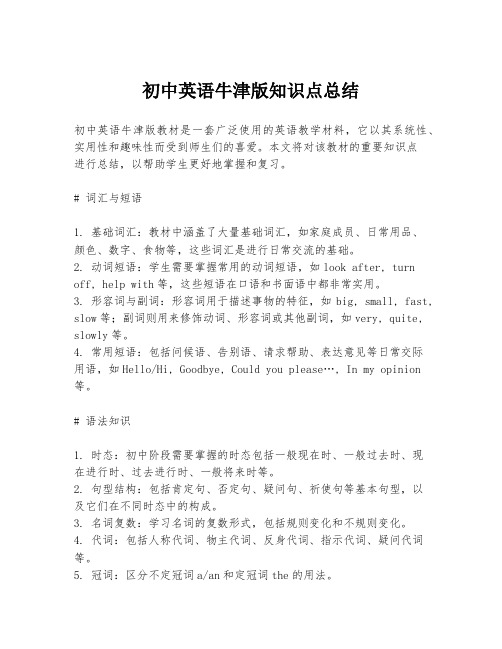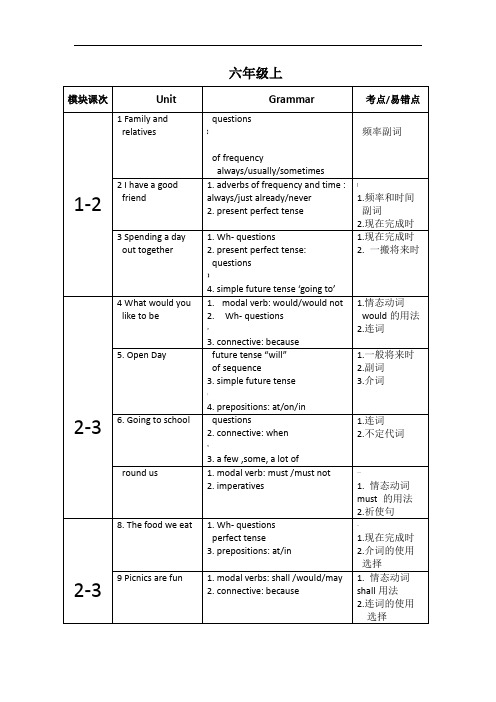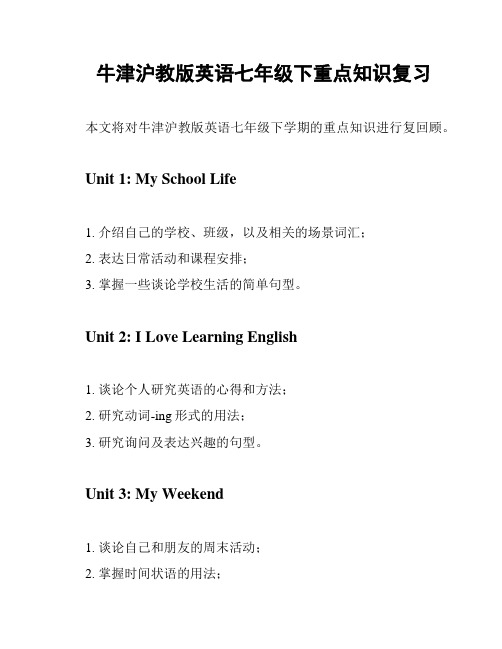牛津初中英语总复习单元知识点总结
初中英语牛津版知识点总结

初中英语牛津版知识点总结初中英语牛津版教材是一套广泛使用的英语教学材料,它以其系统性、实用性和趣味性而受到师生们的喜爱。
本文将对该教材的重要知识点进行总结,以帮助学生更好地掌握和复习。
# 词汇与短语1. 基础词汇:教材中涵盖了大量基础词汇,如家庭成员、日常用品、颜色、数字、食物等,这些词汇是进行日常交流的基础。
2. 动词短语:学生需要掌握常用的动词短语,如look after, turn off, help with等,这些短语在口语和书面语中都非常实用。
3. 形容词与副词:形容词用于描述事物的特征,如big, small, fast, slow等;副词则用来修饰动词、形容词或其他副词,如very, quite, slowly等。
4. 常用短语:包括问候语、告别语、请求帮助、表达意见等日常交际用语,如Hello/Hi, Goodbye, Could you please…, In my opinion 等。
# 语法知识1. 时态:初中阶段需要掌握的时态包括一般现在时、一般过去时、现在进行时、过去进行时、一般将来时等。
2. 句型结构:包括肯定句、否定句、疑问句、祈使句等基本句型,以及它们在不同时态中的构成。
3. 名词复数:学习名词的复数形式,包括规则变化和不规则变化。
4. 代词:包括人称代词、物主代词、反身代词、指示代词、疑问代词等。
5. 冠词:区分不定冠词a/an和定冠词the的用法。
6. 介词:学习常用介词如in, on, at, for, with等及其用法。
7. 连词:掌握并列连词and, but, or, so等和从属连词because, since, although等的使用。
8. 非谓语动词:学习动名词、分词(现在分词和过去分词)的构成和用法。
# 阅读理解1. 主旨大意:学会从文章中提取主旨大意,理解作者的主要观点。
2. 细节理解:能够捕捉文章中的具体信息,如时间、地点、人物、事件等。
牛津上海版初中英语各单元知识点

六年级上
;
重点:介词:at, on, in,情态动词:would, must, shall,一般将来时,现在完成时,不定代词:a few, some, a lot of
六年级(下)
一.共分为11个单元,各单元内容为:
六年级下
重点:情态动词用于情景交际,介词:for, if, with, from,there be句型,一般将来时。
七年级(上)
一.共分为11个单元,各单元内容为:
七年级上
;
重点:祈使句,方位介词,副词,现在完成时,so/neither句型
七年级(下)
一.共分为11个单元,各单元内容为:
七年级下
重点:介词的使用,代词:物主代词,反身代词,形容词,现在完成时
八年级(上)
一.共分为7个单元,各单元内容为:
八年级上
重点:一般过去时,可数不可数名词,基数词,序数词,过去分词作状语
八年级(下)
一.:
一.共分为7个单元,各单元内容为:
八年级下
重点:连词and but so的使用,状语从句,宾语从句,should/ought to句型,情态动词的用法,现在进行时
九年级(上)
一.共分为7个单元,各单元内容为:
九年级上
重点:不定式的用法,形容词副词的比较级,现在完成时
九年级(下)
一.共分为5个单元,各单元内容为:
九年级下
重点:定语从句,状语从句,间接引语,过去进行时,过去完成时。
七年级英语牛津知识点总结

七年级英语牛津知识点总结七年级英语是初中英语中的开端,也是从容易到难的阶段。
在这一年级里,学生们需要尽可能地掌握一些基础知识点,这些知识点将会铺垫他们未来的学习和考试。
以下将详细列举七年级英语的牛津知识点总结。
一、基础语法:名词与代词名词是指人、物、地方和抽象的事物等,是构成句子的主要成分之一。
名词有单数和复数两种形式,单数形式可以加-s或-es。
代词是指代一个或几个名词的词语,可以代替名词在句子中的使用。
常见的代词有人称代词、物主代词和指示代词等。
二、基础语法:动词时态动词时态是动词在时间上的表示法,主要包括三个时态:一般现在时、一般过去时和一般将来时。
其中,一般现在时表示某个动作现在正在进行,一般过去时表示某个动作已经发生过,一般将来时表示某个动作将要发生。
三、基础语法:形容词和副词形容词是一种描述性的词语,主要用来描述名词的性质和特征。
形容词有比较级和最高级两种形式,可以用来表示不同事物之间的大小关系。
副词是表示时间、地点、方式、程度等词语,可以修饰动词、形容词和其他副词。
副词有许多种类,如时间副词、频率副词、程度副词等。
四、基础语法:连词和介词连词是把单词、词组或句子连接在一起的词语,用来构建复合句。
常见的连词有并列连词、从属连词和关系代词。
介词是描述时间、空间或关系的词语,通常出现在名词或代词前面。
介词有许多种类,如表示时间的at、on和in,表示空间的in、on和at,表示关系的by、with和to等。
五、词汇积累英语词汇量的积累是非常重要的,这会在真实的情况下帮助学生们更好地交流。
一般来说,七年级的学生应该掌握2000个常用的英语单词,涵盖日常生活和学术用语。
六、语音和语调在学习英语时,正确的语音和语调是至关重要的。
七年级的学生应该注重英语的语音和语调的学习和实践,以便更好地理解和表达英语。
总之,七年级英语学习需要打牢基础,掌握一些基本的语法和词汇知识,这将为将来的学习和考试打下坚实的基础。
牛津沪教版英语七年级下重点知识复习

牛津沪教版英语七年级下重点知识复习
本文将对牛津沪教版英语七年级下学期的重点知识进行复回顾。
Unit 1: My School Life
1. 介绍自己的学校、班级,以及相关的场景词汇;
2. 表达日常活动和课程安排;
3. 掌握一些谈论学校生活的简单句型。
Unit 2: I Love Learning English
1. 谈论个人研究英语的心得和方法;
2. 研究动词-ing形式的用法;
3. 研究询问及表达兴趣的句型。
Unit 3: My Weekend
1. 谈论自己和朋友的周末活动;
2. 掌握时间状语的用法;
3. 掌握一些听力技巧。
Unit 4: Jobs
1. 研究表示职业的词汇;
2. 表达及询问个人志愿和理想。
Unit 5: Food and Drink
1. 研究食物和饮品的词汇;
2. 掌握询问及表述食物喜好和不喜好的方法。
Unit 6: Sports and Hobbies
1. 研究表示不同体育项目和爱好的单词;
2. 表达及询问个人感受和喜好。
Unit 7: Travelling
1. 谈论旅游的相关话题;
2. 表达和询问喜欢或不喜欢旅游的理由和偏好。
Unit 8: Festivals and Celebrations
1. 研究表示节日和庆祝活动的单词;
2. 谈论家庭或朋友间的庆祝活动。
总结
以上是牛津沪教版英语七年级下学期的重点知识复习,希望对大家的英语学习有所帮助。
最全面牛津版八年级上册英语各单元知识点总复习归纳总结

最全面牛津版八年级上册英语各单元知识点总复习归纳总结1. Unit 1: Greetings and Introductions- Present simple tense- Questions with "what" and "where"2. Unit 2: School Life- Describing school subjects- Using adjectives to describe teachers and classmates- Asking and answering questions about school routines3. Unit 3: Hobbies- Vocabulary related to hobbies and interests- Expressing likes and dislikes- Present continuous tense4. Unit 4: Food and Health- Food vocabulary and describing preferences- Expressing opinions on healthy eating habits- Imperative sentences for giving suggestions and instructions5. Unit 5: Holidays and Traditions- Vocabulary related to holidays and celebrations- Describing past events- Using time expressions and prepositions to talk about when and where6. Unit 6: Environment- Vocabulary related to environmental issues- Expressing concerns and suggestions for protecting the environment- Present perfect tense to talk about experiences7. Unit 7: Jobs and Career Choices- Vocabulary related to different professions- Talking about future plans and aspirations- Using "will" and "going to" for future predictions and intentions- Expressing opinions on advantages and disadvantages of technology- Present perfect continuous tense这份文档总结了八年级上册牛津版英语教材各单元的知识点。
牛津译林版英语七年级上册各单元重要概念归纳

牛津译林版英语七年级上册各单元重要概
念归纳
单元一:你好
- 研究基本问候语和自我介绍
- 研究用英语介绍自己的名字、年龄和国籍
- 研究用英语进行简单的日常交流
单元二:我的家庭
- 研究用英语表达家庭成员的名字
- 研究用英语描述家庭成员的外貌和特征
- 研究用英语描述家庭成员的职业和兴趣爱好
单元三:我的学校生活
- 研究用英语表达学校设施和场所的名称
- 研究用英语描述学校日常生活的活动和安排
- 研究用英语介绍自己在学校的角色和职责
单元四:时间和日期
- 研究用英语表达星期、月份和季节的名称
- 研究用英语询问和回答关于时间和日期的问题- 研究用英语描述日常活动的时间和顺序
单元五:我的日常生活
- 研究用英语描述自己的日常活动和作息时间- 研究用英语询问和回答关于日常生活的问题- 研究用英语描述喜欢的食物、运动和爱好
单元六:购物
- 研究用英语表达购物场所和商品的名称
- 研究用英语询问和回答关于购物的问题
- 研究用英语描述购物时的交流和讨价还价
单元七:体育运动
- 研究用英语表达不同的体育运动项目
- 研究用英语询问和回答关于体育运动的问题- 研究用英语描述自己参与过的体育运动经历
单元八:健康和饮食
- 研究用英语表达健康和饮食方面的词汇
- 研究用英语询问和回答关于健康和饮食的问题
- 研究用英语描述自己的饮食偏好和健康惯
以上为《牛津译林版英语七年级上册》各单元的重要概念归纳。
*Note:* *此文档为简要概述,以帮助读者快速了解各单元内容,具体细节可参考教材。
*。
初中英语知识点总结牛津版(6篇)

初中英语知识点总结牛津版(6篇)1、主语:句子所陈述的对象。
2、谓语:主语发出的动作。
一般是有动作意义的动词。
3、宾语:分为动词宾语和介词宾语,属于动作的承受者。
4、系动词:表示状态或状态变化的动词,没有实际的动作意义。
如be,感官系动词(look, sound, smell,taste和feel)、保持类系动词(keep, stay和remain)、状态变化类系动词(become、get、turn和go)等。
5、表语:紧跟系动词后面的”成分。
6、定语:修饰名词或代词的成分。
7、状语:修饰形容词、副词、动词或句子的成分。
8、补语:分为宾语补足语和主语补足语。
是对宾语和主语的补充说明,与其有主动或被动的规律关系。
例如:You should keep the room clean and tidy.你应当让屋子保持洁净干净。
(You是主语,shouldkeep是谓语,the room是宾语,clean and tidy是宾语补足语。
)This kind of food tastes delicious.这种食物吃起来很可口。
(This kind offood是主语,tastes是系动词,delicious是表语。
)初中英语学问点总结牛津版篇四初中英语学问点总结牛津版篇六初中英语备考学问点:不行数名词1、不行数名词前一般不加冠词,尤不加不定冠词:若加a(an)则使之详细化了。
如:have a wonderful time.2、不行数名词作主语,谓语动词用第三人称单数形式。
3、不行数名词一般无复数形式。
局部物质名词在表不同类别时,可用复数形式。
如:fishes(各种各样的鱼), newspapers(各种报纸),waters(河湖、海水), snows(积雪)……4、有些抽象名词也常用复数,变为可数的详细的`事物。
如:times 时代,works 著作,difficulties 困难5、在表数量时,常用“of”词组来表示。
牛津版英语初三知识点总结

牛津版英语初三知识点总结Unit 1:In this unit, students learn to introduce themselves and others, talk about their daily routines and discuss things happening around them. They also learn about simple present tense, adverbs of frequency, simple past tense and present continuous tense.Unit 2:In this unit, students learn to talk about their favorite activities, express their likes and dislikes, give reasons for their preferences and discuss daily routines. They also learn about comparative and superlative adjectives, present continuous tense for future arrangements, and time expressions.Unit 3:In this unit, students learn to talk about their plans and intentions, express future intentions and actions, ask for and give directions, and discuss future arrangements. They also learn about going to for future plans and arrangements, imperative sentences, prepositions of movement and place, and time expressions.Unit 4:In this unit, students learn to talk about past events, express regrets and wishes, give advice, and discuss travel experiences. They also learn about past continuous tense, past modals for regrets and wishes, modal verbs for advice, and adverbs of manner.Unit 5:In this unit, students learn to talk about their study habits, describe school subjects, discuss daily routines, and express preferences for different activities. They also learn about present perfect tense, adverbs of frequency and definite time, question tags, and prepositions of time.Unit 6:In this unit, students learn to talk about environmental issues, discuss solutions to environmental problems, express concerns, and suggest actions to protect the environment. They also learn about modals for advice and suggestions, conditional sentences, and question tags.Unit 7:In this unit, students learn to talk about their family and friends, describe people’s physical appearance and personality, discuss family relationships, and express opinions. They also learn about present continuous tense for future arrangements, future time clauses, adjectives to describe people, and adverbs of manner.In this unit, students learn to talk about their free time activities, express likes and dislikes for different activities, make plans and arrangements, and discuss leisure time habits. They also learn about past perfect tense, adverbs of frequency and definite time, time clauses, and prepositions of time and place.Unit 9:In this unit, students learn to talk about their achievements, express ambitions and dreams, discuss future plans and intentions, and give reasons for their choices. They also learn about going to for future plans and arrangements, modals for predictions and possibilities, gerunds and infinitives, and modal verbs for obligations and necessities.Unit 10:In this unit, students learn to talk about memorable experiences, express emotions and feelings, discuss events and activities, and describe personal experiences. They also learn about past perfect continuous tense, present perfect continuous tense, past modals for deductions, and modals for probability and possibility.Unit 11:In this unit, students learn to talk about cultural events, express opinions and preferences for different activities, discuss customs and traditions, and describe festivals and celebrations. They also learn about modals for suggestions and requests, conditional sentences, adjectives to describe events, and adverbs of frequency.Unit 12:In this unit, students learn to talk about their favorite movies, describe movie genres and plots, discuss characters and actors, and express likes and dislikes for different movies. They also learn about present perfect tense and past simple tense, adjectives to describe movies and characters, comparative and superlative adjectives, and question tags.Unit 13:In this unit, students learn to talk about food and drinks, express likes and dislikes for different types of food, discuss recipes and cooking methods, and describe their favorite dishes. They also learn about present continuous tense for future arrangements, future time clauses, gerunds and infinitives, and prepositions of time and place.Unit 14:In this unit, students learn to talk about their favorite sports, describe sports events and competitions, discuss athletes and teams, and express preferences for different sports. They also learn about past perfect tense, adjectives to describe sports and athletes, adverbs of frequency and definite time, and time clauses.In this unit, students learn to talk about their travel experiences, discuss destinations and attractions, express opinions and preferences for different travel activities, and describe their dream vacations. They also learn about modals for suggestions and requests, conditional sentences, adjectives to describe places and attractions, and adverbs of manner. In conclusion, the Oxford English for Middle School curriculum covers a wide range of language skills and knowledge points, including grammar, vocabulary, speaking, listening, reading, and writing. The units are designed to help students develop their communicative competence, critical thinking skills, and intercultural awareness, and to help them become successful English language learners.。
- 1、下载文档前请自行甄别文档内容的完整性,平台不提供额外的编辑、内容补充、找答案等附加服务。
- 2、"仅部分预览"的文档,不可在线预览部分如存在完整性等问题,可反馈申请退款(可完整预览的文档不适用该条件!)。
- 3、如文档侵犯您的权益,请联系客服反馈,我们会尽快为您处理(人工客服工作时间:9:00-18:30)。
九上Unit 3
1.problem多指客观存在的需要动手,动脑或用实际行动去解决的问题,也指理科课程的
习题或与数字,事实有关的问题。
question多指由于对某事感到疑惑不解而提出的需要动口去解决的问题。
2.be on上演,开着;可以表示延续状态
3.drive sb mad使某人发疯
be mad at sb生某人的气
4.close adj.密切的,亲密的
adv.近,接近
vt.关闭
5.lonely孤独的,寂寞的,带感情色彩,强调心灵上的寂寞和孤独。
还有荒凉的,偏僻的
之意。
alone可作形容词或副词,单独,独自,,强调客观上的单独,没有同伴,但并不指心理上的寂寞,因而无感情色彩。
也有仅仅,只有之意。
6.deal with处置,处理,常与疑问词how连用
do with处置,处理,常与what连用
7.quarrel with sb.和某人争吵
quarrel about sth为某事争吵
8.have no choice but to do sth除了做某事外无可选择
make a choice做出选择
have no choice没有选择
9.(1)refuse+名词,代词拒绝…….
(2)refuse to do sth拒绝做某事
(3)refuse sb sth拒绝某人某物
10.accept除了客观上的收到之意外,主要强调主观上的接受
receive表示客观上收到,接到,不含有主观上的接受之意
11.hard硬的,困难的,艰苦的,努力地,猛烈地
hardly几乎不,用于附加疑问句时,附加疑问句要用肯定形式,放在句首时,句子要倒装如果一个句子中含有no,hardly,never,scarcely,little,few等表示否定意义的词时,反义疑问句要用肯定的疑问形式
12.doubt怀疑,疑惑,后常接宾语从句。
主句为肯定句时从句用if或whether来引导,主句为否定句或疑问句时,从句用that引导。
(1)引导疑问语气的宾语从句时,一般情况下whether 和if可以互换(2)在动词discuss和介词后只能用whether,不能用if(3)在引导主语从句,表语从句,同为语从句时只能用whether。
13.be worth doing sth值得做某事
14.offer sb sth=offer sth to sb将某物提供给某人
offer强调愿意给予,主动提供,而provide意为供应,供给,指有远见,为应付意外或紧急状况等做好充分准备,尤指提供生活用品。
provide sth for sb=provide sb with sth向某人提供某物
15.suggestion可数名词,建议
(1)suggest sth to sb向某人建议某事
(2)suggest sb doing sth建议某人做某事
(3)suggest+宾语从句建议…….(谓语动词为should+动词原形)
Suggestion多指为改进工作,解决问题而提出的建议,是可数名词;而advice多指根据自己的学识和经验提出来的供人参考的意见,没有suggestion委婉,是不可数名词。
16.be of(some/great)value有(些/很大)价值
“be of+某些名词”相当于“be+相对应的形容词”
17.be crazy about对….着迷
be crazy for sth渴望某物
be crazy for sb迷恋某人
18.plenty of大量的,充足的,修饰复数名词和不可数名词
19.stay out呆在外面,在外过夜
stay up熬夜
stay away远离
stay at home呆在家里
20.allow sb to do sth允许某人做某事
21.be strict with sb对某人要求严格
be strict in sth对某事要求严格
22.wish后接宾语从句时,从句需用虚拟语气,表示某一强烈且难以实现的愿望。
一般来说,表示现在的愿望,从句用一般过去时,表示过去没有实现的愿望,从句用过去完成时,表示将来的愿望,从句用一般过去时(be动词只有were一种形式)或could/would do。
23.(1)work on后跟的是具体对象,即从事某项具体工作
(2)work at后跟的是所从事的工作的性质(即时间,精力用在某一方面的事情上)而不是说明正在做什么。
(3)work out后跟需要经过数学计算等才能解决的计划,题目等,意为“算出,解出,设计出,制定出”。
24.be busy with sth忙于某事
be busy (in)doing sth忙于做某事
25.at the moment此时此刻,目前
at that moment在那时
wait a moment稍等
a moment ago刚才
in a moment很快,不久
26.to tell you the truth老实说
27.spare vt.留出,匀出adj.多余的,空闲的
28.(1)notice+名词/动词
(2)notice sb do/doing sth注意到某人做/正在做某事
(3)notice+宾语从句
ugh at嘲笑
30.be proud of以…..而自豪,以…..为骄傲
31.reply to sb/sth对某人或者某物做出回答或反应
answer the telephone接电话
answer the door开门
32.with pleasure意为愉快的,十分乐意,用来回答对方的请求
33.suffer from (doing)sth因(做)某事而受苦,受折磨,无被动语态
34.though虽然,尽管,不能与but连用,但可与yet,still连用。
though引导的让步状语从句可放在主句前,也可放在主句后,但although引导的让步状语从句总是置于句首。
35.ask sb for sth向某人要某物
36.be sure确信,有把握be not sure不确信
(1)be sure+宾语/从句,表示肯定,有把握。
句子/主句的主语必须是人。
(2)be sure用于祈使句中,后面常跟动词不定式,意为务必,一定,表示说话者向对方所提出的要求。
(3)主语+be sure+to do sth还可表示一定肯定,通常用来表示说话者的推断或判断,主语可以是人,也可以是物。
(4)be sure of/about表示主语“相信”或者“对…….有把握”,后面可接名词代词或动名词,主语必须是人,不能是物。
37.cause后接介词of意为……的原因,表示引起某事发生的直接原因
reason表示原因时常与介词for连用,表示解释某事的理由或原因
(1)cause sth引起某事
(2)cause sb sth=cause sth to sb给某人带来某事,多指不好的事情
(3)cause sb to do sth使某人做某事
38.keep fit保持健康
keep后接动词时要用动名词形式
39.why not do sth=why don’t you do sth你为什么不做某事
40.keep sth to oneself不让别人知道某事
41.whole与all意思相同,与whole连用时冠词位于whole之前,与all连用时,冠词放在all 之后。
42.in turns=take turns依次,轮流。
